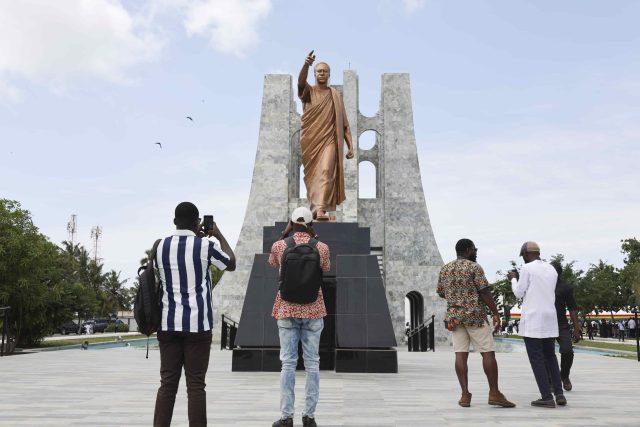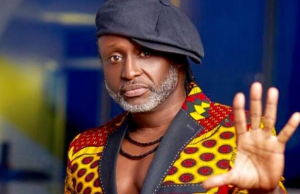Dr Sir Sam Jonah, Chancellor of the University of Cape Coast (UCC), has asked Ghanaians to be inspired by the confidence of Ghana’s founding father, Dr. Kwame Nkrumah, to work hard for the country’s socio-economic development.
He reminded all the people to imbibe the tenets of endurance, Pan-Africanism, democracy, rule of law, freedom, and justice that were the ideals and principles of Dr. Nkrumah.
Dr Sir Jonah gave the advice when he opened the 13th Kwame Nkrumah Memorial Lectures at the UCC on Thursday, October 19, 2023.
The two-day series of lectures hosted by UCC in honour of Dr. Nkrumah, offered an opportunity to reflect on his profound contributions and engage in thoughtful discussion about the enduring relevance of his ideas.
It was being held on the theme: “Diaspora, Pan-Africanism, and spiritual awakening: Nkrumah’s years abroad and as Head of State.”
The programme would present opportunities for all to contemplate on how Dr. Nkrumah’s vision could be leveraged in addressing the many challenges that continued to plague the African continent.
According to Dr Sir Jonah, what sets the great leader apart was not only his historical significance to “us but also the enduring relevance of his ideas and insights.”
“He foresaw and wrote extensively about the multifaceted challenges that Africa faces today, encompassing political, social, and economic dimensions,” he said of Dr Nkrumah.
“His ability to articulate these challenges with clarity and propose solutions underscores his status as a pre-eminent thinker and doer,” the Chancellor noted.
Dr. Jonah said Dr. Nkrumah’s leadership frontiers had been recognized globally, making him the greatest leader in the post-colonial era, for his pivotal role in the emancipation of Africa from colonial rule.
That feat, he stated, reverberated through the annals of history, making him a visionary whose ideas and leadership transcended his time, leaving an indelible mark on the course of history.
“Dr. Nkrumah’s unwavering commitment to serving the interests of the common man remains a guiding light for our leaders today. His ideas continue to shape the aspirations of leaders and citizens striving for a better future in Africa and indeed the world at large.
“His achievements, with Ghana’s independence struggles and his broader pan-African vision, are nothing short of legendary. His legacy has only grown more profound and celebrated since his passing,” Dr. Jonah observed.
According to him, nationalists’ politics was dangerous, making several of the first generation of independent Africa’s leaders, leaving prison to Government House.
He said many of such leaders saw it as a “calling” and this noble sense of vocation was not surprising because many were products of missionary education.
However, the secular nature of the sovereign African state relegated the place and role of spirituality to the personal lives of Africa’s early leaders, concealing the importance of these influences in their public lives.
Prof. Emmanuel Kwaku Akyeampong, Professor of history of African and African American Studies at Harvard University, who was this year’s speaker, on his part, provided intimate portraits of Nkrumah in his years abroad as a student, and his interior life as head of state to portray his great sense of humour, seriousness, and determination in life.
As a student in the United States, he said Nkrumah’s faith and religious networks were his key support.
He was a licensed Presbyterian preacher, but his experience of race and his interrogation of empire and capitalism ignited a questioning pan-African spirit in him.
That he said made Dr. Nkrumah question organized religion and the authority it wielded over Africans, but he did not reject religion and the solace of spirituality.
For Dr. Acheampong: “The intersection of Pan-Africanism and spirituality shaped Nkrumah’s faith journey and, indirectly, his politics in distinctive ways.
“More importantly, after the assassination attempts on his life as President of Ghana.”
The Kwame Nkrumah Memorial Lecture series was instituted by UCC in 1974 and inaugurated in November 1976 by Dr. Archie Casely Hayford to address issues of social economic and political development of Africa and the black race that were of importance to Dr. Nkrumah.
Some speakers of previous years lectures included Mr. Eleazar Chukwuemeka Anyaoku, former Secretary-General of the Commonwealth, Mr. Benjamin William Mkapa, former President of Tanzania, Prof. Kwesi Botchwey, former Minister of Finance, Mr. Kwaku Baprui Asante, a former Secretary to Dr. Nkrumah, Prof. Patrick Loch Otieno Lumumba, Director and Chief Executive Officer of the Kenya School of Law, Prof. Akilagpa Sawyerr, a renowned Prof. of Law, and former Vice-Chancellor, University of Ghana.















